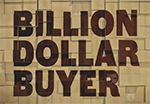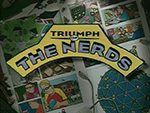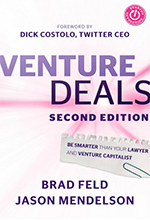 Billion Dollar Buyer is a show on CNBC where a billionaire entrepreneur from Houston meets with small business owners on their own turf to negotiate a purchase that will both improve the billionaire’s customer experience and help that business grow. Every episode features the billion dollar buyer, two businesses soliciting an offer, and the process they all go through to ultimately walk away or close a deal. Sounds simple enough, right? And yet you’d be surprised the mistakes these business owners make that results in missing their single biggest sales opportunity. Each episode of this show is two useful business case studies.
Billion Dollar Buyer is a show on CNBC where a billionaire entrepreneur from Houston meets with small business owners on their own turf to negotiate a purchase that will both improve the billionaire’s customer experience and help that business grow. Every episode features the billion dollar buyer, two businesses soliciting an offer, and the process they all go through to ultimately walk away or close a deal. Sounds simple enough, right? And yet you’d be surprised the mistakes these business owners make that results in missing their single biggest sales opportunity. Each episode of this show is two useful business case studies.
Know Your Customer
 Tilman Fertitta is the billion dollar buyer. Understanding any potential customer is essential to understanding what that customer is looking to buy. Tilman is a self-made entrepreneur and the sole owner of Landry’s, Inc. He built up Landry’s from a single seafood restaurant into a hospitality empire that now consists of more than 500 restaurants across sixty different brands, along with a dozen hotels, resorts, and casinos. Tilman Fertitta also recently bought the Houston Rockets.
Tilman Fertitta is the billion dollar buyer. Understanding any potential customer is essential to understanding what that customer is looking to buy. Tilman is a self-made entrepreneur and the sole owner of Landry’s, Inc. He built up Landry’s from a single seafood restaurant into a hospitality empire that now consists of more than 500 restaurants across sixty different brands, along with a dozen hotels, resorts, and casinos. Tilman Fertitta also recently bought the Houston Rockets.
Tilman is like many people you meet in Houston. Traditional values, a slight southern drawl, folksy, but also no bullshit. And he’s got one trait in common with every self-made businessperson I’ve ever met: he’s stubborn. I mean that as a compliment. He earned his money himself. If anybody’s gonna spend it, it’s gonna be him. Because Tilman earned his own money, he knows the value of a dollar. When he spends his hard-earned money, he knows what he wants and expects a deal.
Hospitality
 Billion Dollar Buyer usually starts with Tilman Fertitta and Jeff Cantwell, Landry’s Chief Development Officer, looking for some specific way to improve the customer experience or lower costs. Some episodes also include the VP of Beverage Operations (James Kramer), Director of Advertising (Alicia Brown), and the Executive Chef (Kathy Ruiz). They all know every detail and cost involved in their operation and work with the businesses to find solutions that are a good fit with Landry’s.
Billion Dollar Buyer usually starts with Tilman Fertitta and Jeff Cantwell, Landry’s Chief Development Officer, looking for some specific way to improve the customer experience or lower costs. Some episodes also include the VP of Beverage Operations (James Kramer), Director of Advertising (Alicia Brown), and the Executive Chef (Kathy Ruiz). They all know every detail and cost involved in their operation and work with the businesses to find solutions that are a good fit with Landry’s.
Restaurants need ingredients like fresh honey, spicy hot sauces, gluten-free breads, and premium drink rimmers. Hotels and resorts need indulgences like linen sheets, designer shower drains, swimwear for pool-side employees, and heated patio furniture. Boutiques in major resorts need luxury products like makeup, jewelry, and luggage. Premium hospitality businesses need commodities like real antique wood and hand-blown glass fixtures. There’s also innovative opportunities to improve efficiency with things like smart LED lighting and self-serve alcoholic beverage kiosks.
First Impressions
 Okay, now imagine you’re a small business owner. You know that a billionaire will fly in on a helicopter, at his own expense, to discuss doing the single largest sale your business has ever had. Oh, and the billionaire is bringing a film crew. So, if nothing else, your business will at least get some free exposure and publicity on television. Wouldn’t it seem like common sense, as the small business owner, that you’d do everything you could to make your business look its best, impress the billionaire, and close the deal?
Okay, now imagine you’re a small business owner. You know that a billionaire will fly in on a helicopter, at his own expense, to discuss doing the single largest sale your business has ever had. Oh, and the billionaire is bringing a film crew. So, if nothing else, your business will at least get some free exposure and publicity on television. Wouldn’t it seem like common sense, as the small business owner, that you’d do everything you could to make your business look its best, impress the billionaire, and close the deal?
A few businesses get it right. Cattle ranchers that have their best horse and saddle ready for Tilman to ride around and check out the beautiful ranch, and also have a full-service chef ready with great beef dishes prepared from every possible cut of beef. Open ocean aquaculturists that invite Tilman to ride along on their fishing boat to see their company’s process of growing and harvesting mussels. Smart lighting consultants with a portfolio of their commercial work, along with a kit that demonstrates the savings in electricity, heating, and FP&L.
Some businesses don’t go out of their way to make a good impression. There’s just no excuse for not having a good demo of your own product. Why waste the opportunity of being on the show if you’re just gonna half-ass do everything? Consider, for example, the moonshine salesman. Tilman Fertitta shows up, sits down at the bar setup in the factory, and asks what the best drink is that can be made with moonshine. Salesman says “Moonshine Mojito”. Tilman says “Well lets have one.” Moonshine salesman says “I don’t have any mint.” Tilman says what everybody is thinking, which is “If it were my moonshine business, and my ability to stay in business hinged on this one deal, then I would’ve had the best mixologist I could find standing behind the bar with every ingredient he could possibly need.” Why offer the guy a drink that you can’t even make?
 Or the alcoholic beverage kiosks that didn’t work. That company makes an innovative product. Their kiosks charge by the ounce instead of by the glass, encouraging patrons to sample more beers and spend more money. The company has a perfect installation of a dozen kiosk-based taps setup at a nearby brewery. Instead, the founders invite Tilman to their headquarters to see a demo using a setup where none of the taps are connected to any kegs and isn’t fully functional. The in-house setup also didn’t work right because the founders were experimenting with a new version of the software. On a technical level, the company also ruined their on-site demo at Tilman’s poolside bar by relying on wireless networking. I could see that those kiosks have onboard Ethernet. There was no reason the company should’ve risked their demo failing by relying on wireless instead of Ethernet.
Or the alcoholic beverage kiosks that didn’t work. That company makes an innovative product. Their kiosks charge by the ounce instead of by the glass, encouraging patrons to sample more beers and spend more money. The company has a perfect installation of a dozen kiosk-based taps setup at a nearby brewery. Instead, the founders invite Tilman to their headquarters to see a demo using a setup where none of the taps are connected to any kegs and isn’t fully functional. The in-house setup also didn’t work right because the founders were experimenting with a new version of the software. On a technical level, the company also ruined their on-site demo at Tilman’s poolside bar by relying on wireless networking. I could see that those kiosks have onboard Ethernet. There was no reason the company should’ve risked their demo failing by relying on wireless instead of Ethernet.
A few of the businesses border on being disrespectful. Common courtesy is to always greet your guest in person as soon as they arrive. Creatives also tend to go rogue and provide their own designs instead of what the client specifically requested. There’s a struggling artist that kept raising her prices after the order was already placed. Or the guy in his twenties, already divorced, that used his parents money to buy a tour bus and go around selling overpriced laptop bags. He not only insists for way more money than the bags are worth, but also insults everything else sold in his customer’s gift shop. Or the “experiential marketing” conman that used the branded marketing events to advertise his own business and was really just selling cheap trinkets.
Doing A Deal
 Billion Dollar Buyer has cut-away explanations of each potential deal, including production costs and profit. Quick charts explain details like how the details of each deal would impact the business, decreasing costs and increasing profit. Economics is the problem for some of the show’s small businesses, not professional etiquette. Doing any deal requires the business to know its costs and where it has flexibility. Price elasticity requires Landry’s to consider if they can raise their selling price by adding costs for a premium product. Understanding the dynamics of scale is also important. If Landry’s buys a thousand of something instead of just one, then not only are the business’s costs lower but they also have more negotiating power with suppliers.
Billion Dollar Buyer has cut-away explanations of each potential deal, including production costs and profit. Quick charts explain details like how the details of each deal would impact the business, decreasing costs and increasing profit. Economics is the problem for some of the show’s small businesses, not professional etiquette. Doing any deal requires the business to know its costs and where it has flexibility. Price elasticity requires Landry’s to consider if they can raise their selling price by adding costs for a premium product. Understanding the dynamics of scale is also important. If Landry’s buys a thousand of something instead of just one, then not only are the business’s costs lower but they also have more negotiating power with suppliers.
Food producers also have unique challenges with distribution. Food typically has to be specially packaged, refrigerated, and delivered. Those indirect costs affect the bottom-line. The logistics of food delivery also impacts the production volume. If the business produces too much, then it sits in a warehouse and somebody loses money on spoiled inventory. However, if the business doesn’t produce enough, then it can’t give wholesale prices to big customers and risks leaving money on the table by being unable to fulfill orders.
Closing A Deal
 Every episode of Billion Dollar Buyer ends in the Landry’s boardroom in Houston, Texas. The business owners meet with Tilman Fertitta and present a specific bid, the details of which are explained on-screen. There’s discussion about specific line-item costs and the total size of the deal. Sometimes Tilman agrees to the deal. Sometimes he agrees to a modified deal. Sometimes Tilman gets up from the table and walks away without doing any deal. After the meeting with Tilman in the boardroom, the business owners discuss the outcome of the potential deal and what that means for their business going forward.
Every episode of Billion Dollar Buyer ends in the Landry’s boardroom in Houston, Texas. The business owners meet with Tilman Fertitta and present a specific bid, the details of which are explained on-screen. There’s discussion about specific line-item costs and the total size of the deal. Sometimes Tilman agrees to the deal. Sometimes he agrees to a modified deal. Sometimes Tilman gets up from the table and walks away without doing any deal. After the meeting with Tilman in the boardroom, the business owners discuss the outcome of the potential deal and what that means for their business going forward.
Case Studies
Case studies are perhaps the most valuable aspect of business school. And many other graduate programs, I would imagine. Business school doesn’t always get the respect it deserves because people think its all abstract management theory and learning how to draft TPS reports. But case studies are useful and can actually be quite fun to learn about. I see each episode of Billion Dollar Buyer as two cases studies in how to either run a business or not run a business. There’s eighteen episodes across two seasons of this show, for a total of thirty-six business case studies. The third season starts in January. As both an entrepreneur and former business student, I look forward to watching more of Billion Dollar Buyer.
 Triumph of the Nerds: The Personal Computer
Triumph of the Nerds: The Personal Computer
 Prizeo Brings Together Celebrities And Charities To Increase Awareness And Raise Money
Prizeo Brings Together Celebrities And Charities To Increase Awareness And Raise Money
 Venture Deals Explains Modern Venture Capital
Venture Deals Explains Modern Venture Capital
 Five Years of Y Combinator Universe
Five Years of Y Combinator Universe


![Ooh Child (Five Stairsteps) [Annotations via Genius.com]](../wp-content/uploads/2019/04/boyz-n-the-hood.jpg)



